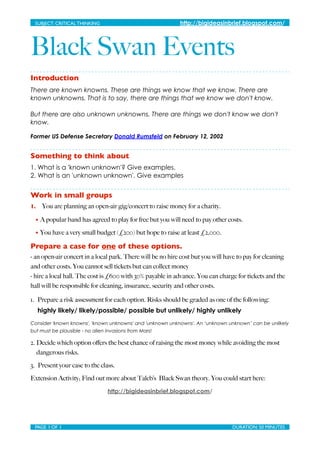
Black Swan Theory
- 1. SUBJECT: CRITICAL THINKING http://bigideasinbrief.blogspot.com/ Black Swan Events Introduction There are known knowns. These are things we know that we know. There are known unknowns. That is to say, there are things that we know we don't know. But there are also unknown unknowns. There are things we don't know we don't know. Former US Defense Secretary Donald Rumsfeld on February 12, 2002 Something to think about 1. What is a 'known unknown'? Give examples. 2. What is an 'unknown unknown'. Give examples Work in small groups 1. You are planning an open-air gig/concert to raise money for a charity. • A popular band has agreed to play for free but you will need to pay other costs. • You have a very small budget (£200) but hope to raise at least £2,000. Prepare a case for one of these options. - an open-air concert in a local park. There will be no hire cost but you will have to pay for cleaning and other costs. You cannot sell tickets but can collect money - hire a local hall. The cost is £600 with 30% payable in advance. You can charge for tickets and the hall will be responsible for cleaning, insurance, security and other costs. 1. Prepare a risk assessment for each option. Risks should be graded as one of the following: highly likely/ likely/possible/ possible but unlikely/ highly unlikely Consider 'known knowns', 'known unknowns' and 'unknown unknowns'. An ‘unknown unknown’ can be unlikely but must be plausible - no alien invasions from Mars! 2. Decide which option offers the best chance of raising the most money while avoiding the most dangerous risks. 3. Present your case to the class. Extension Activity; Find out more about Taleb’s Black Swan theory. You could start here: http://bigideasinbrief.blogspot.com/ PAGE 1 OF 1 DURATION: 50 MINUTES
